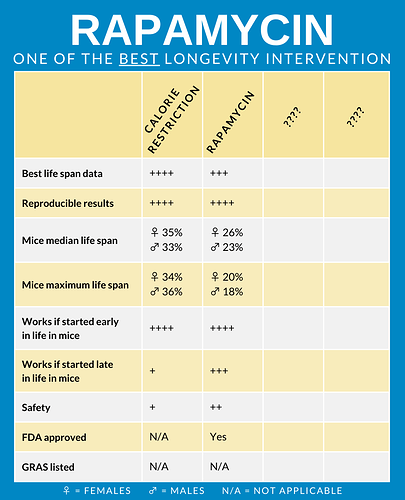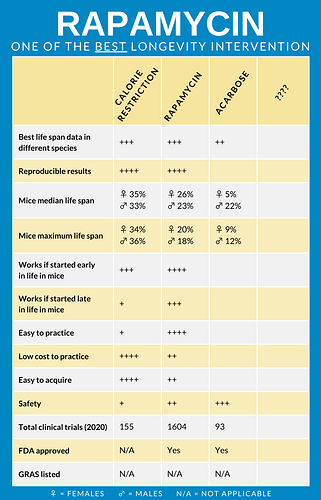I’m sketching on a new summary of four of the best promising longevity interventions based on science. First and second place are quite clear but what interventions should be placed on the third and fourth place? This should be basic knowledge about interventions. All feedback is welcome!
I would say Exercise would be between CR and Rapamycin. Then the other ITP small molecules after Rapamycin. You could add a healthy diet in there somewhere as well.
Many say that exercise is the golden standard but I haven’t seen any good studies showing it will increase maximum lifespan for example in mice (or humans). There are many studies showing that healthspan, life quality and median lifespan is improved but I have not seen any on maximum lifespan. If you find any on mice or in other species please let me know.
Here is one study on mice which found only healthspan improvements:
Conclusion: Life-long spontaneous exercise does not prolong lifespan but improves healthspan in mice. Exercise is an intervention that delays age-associated frailty, enhances function and can be translated into the clinic.
Source: Life-long spontaneous exercise does not prolong lifespan but improves health span in mice - PubMed
Here is interesting key points from a review about exercise and longevity:
- On the basis of observational population studies, high physical activity is associated with a reduced risk of premature death, but causal relationship remains unproven.
- Participation in physical activity at a specific time-point is an indicator of good fitness and health, and is associated with a reduced risk of death.
- At present, there are no definitive data with which to draw final conclusions for the effect of adulthood physical activity on lifespan, either from randomised controlled trials or experimental animal studies.
- Lifelong physical activity may extend lifespan, but evidence from interventional studies is limited to some suggestive findings; the potential effects of (early) childhood physical activity versus inactivity on later health needs more research.
- The possible life-shortening effects of vigorous physical activity are understudied.
- Physical activity improves fitness and physical function, and confers other health-related benefits. These outcomes have a greater basis in terms of evidence-based data than any claims of a reduced risk of death, especially when recommending physical activity for previously physically inactive middle-aged and elderly adults.
Source: Is physical activity a cause of longevity? It is not as straightforward as some would believe. A critical analysis - PubMed
So CR and rapamycin I would say is more powerful interventions than exercise. But if we can find good data which shows increase in median and maximum lifespan then I’m happy to change my mind. I exercise daily but it’s more to increase healthspan and life quality than in trying to increase maximum lifespan a lot. It would probably help a little bit but it will not alone have any big impact on my maximum lifespan is my guess.
Results of 13 studies describing eight different cohorts suggest that regular physical activity is associated with an increase of life expectancy by 0.4 to 6.9 years. Eleven studies included confounding risk factors for mortality and revealed an increase in life expectancy by 0.4 to 4.2 years with regular physical activity. Eleven case control studies on life expectancy in former athletes revealed consistently greater life expectancy in aerobic endurance athletes but inconsistent results for other athletes. None of these studies considered confounding risk factors for mortality. In conclusion, while regular physical activity increases life expectancy, it remains unclear if high-intensity sports activities further increase life expectancy.
Yes, I fully agree that it can have an impact on median lifespan which is almost the same as life expectancy. But this does not mean that maximum lifespan is increased. There are many interventions which show median lifespan increase but not maximum lifespan increase.
By the way, I found this interesting rat study on exercise and CR. This shows how powerful CR can be because even if the rat is sedentary it prolongs lifespan more than exercise alone.
Although the exercise improved survival, it did not result in an extension of life-span. In contrast, the food-restricted paired-weight sedentary rats showed a true increase in life-span.
Source: Effect of voluntary exercise on longevity of rats - PubMed
This was also a funny study on worms where healthspan improved but not maximum lifespan:
Our data reveal the broad impact of swim exercise in promoting extended healthspan of multiple C. elegans tissues, underscore the potency of early exercise experience to influence long-term health, and establish the foundation for exploiting the powerful advantages of this genetic model for the dissection of the exercise-dependent molecular circuitry that confers system-wide health benefits to aging adults.
… Our survival assays revealed that a 3+3+2+2 swim exercise regimen does not change the maximum lifespan of C. elegans population
Source: Swim exercise in Caenorhabditis elegans extends neuromuscular and gut healthspan, enhances learning ability, and protects against neurodegeneration - PubMed
The paper doesn’t say median lifespan. It says it increases life expectancy .
I think you can illustrate the different expression like this
| Person | Age of death | ||||
| 1 | 20 | ||||
| 2 | 46 | ||||
| 3 | 52 | ||||
| 4 | 58 | ||||
| 5 | 60 | = Median lifespan | |||
| 6 | 72 | ||||
| 7 | 84 | ||||
| 8 | 90 | ||||
| 9 | 102 | = Maximum lifespan | |||
| 10 | 112 |
Life expectancy = (Sum of all ages) / (Total persons) = 695 / 10 = 69,5 years
So median lifespan is almost the same as life expectancy. So if life expectancy goes up with 5 years then the result is 69.5 + 5 = 74.5 years.
I nominate “carb control” as one of the four. If there are only going to be four I would lump acarbose, canagliflozin and empagliflozin, etc. into one category.
![]() I like the the category “carb control” or what do you say about “carbohydrate restriction” instead? But on the other hand it would be great to specify what type of carb control has the best effect. For example lifespan data differs quite much between Acarbose and Metformin. The ITP showed recently that Acarbose had the best effect but I don’t know how other studies are in the field and in other species. Someone?
I like the the category “carb control” or what do you say about “carbohydrate restriction” instead? But on the other hand it would be great to specify what type of carb control has the best effect. For example lifespan data differs quite much between Acarbose and Metformin. The ITP showed recently that Acarbose had the best effect but I don’t know how other studies are in the field and in other species. Someone?
Exercise, diet, sleep, Rapa.
@KarlT Do you have median and maximum lifespan data on mice on the first three ones?
For example regarding exercise I wrote two posts above here. What do you think about that? Exercise can not be the best one.
This is the latest version of the summary. I’m trying out and see if Acarbose fits in there but it’s a compound that I don’t have so much knowledge about more than the ITP. For example what is the safety of it, do you need prescription, what is the cost, does it extend lifespan if it started early and/or late in life? Any suggestions?
No. And I realize your question was about longevity. But I think my four choices are best for health span. The problem with individual interventions is that we don’t know the effects of combining these interventions.
There have been 1604 clinical trials on Rapamycin? Wasn’t it just 64? Seems to be a large discrepancy.
Also cost and safety for Rapamycin are a bit low? Three plusses maybe?
![]() There are some interesting indication where combination of interventions are done and more of that will come in future.
There are some interesting indication where combination of interventions are done and more of that will come in future.
Here is for example a combination with rapamycin and acarbose in the ITP which lead to the biggest increase male lifespan which they have reported.
Here is interesting additative effects when rapamycin is combined with calorie restriction.
Here is one study on the additative effect on rapa and CR on fruit flies:
Even if these are interesting indications of promising combinations between interventions we are long from getting everything optimal. I really like this image that I created awhile ago to point out that it’s all about finding the right balance between anabolism and catabolism.
Possibly acarbose should be separated from SGLT2 inhibitors and both items listed. They act upon the body in very different ways and I think (please any forum members correct me if I am wrong) they both have beneficial effects apart from carbohydrate restriction effects.
The 1604 clinical trials on rapamycin and on the other interventions is from this study: The road ahead for health and lifespan interventions - PubMed
Regarding cost of rapamycin I think three plus is too low price. There are many people here trying to lower their cost of rapamycin and some people don’t have the money for buying it. Here in Sweden if I buy it from the pharmacy the cost is 386 USD for 100 mg so my yearly cost will be around 1100 USD depending on dose. It’s quite much money if you compare that to calorie restriction which is free and even saves money. But let’s see what the other two interventions cost. Do you know what the yearly cost of Acarbose is?
FWIW
100mg, 90 tablets cost $14.45 with a discount coupon in North Jersey, USA at a Rite Aid Pharmacy as of 12/11/2022
That is a really great price! Is that common in the USA? Then I understand @DeStrider why you want more plusses on rapamycin. Is it the same price for you?
AKG Alpha Ketoglutaric Acid ?
Matt Kaeberlein had said in a Tim Ferris interview was most promising anti - aging compound to investigate further after rapamycin.
Also see NIH articles

